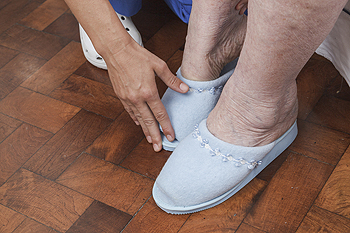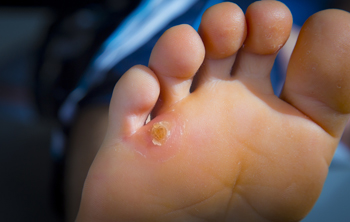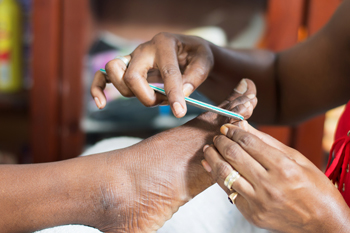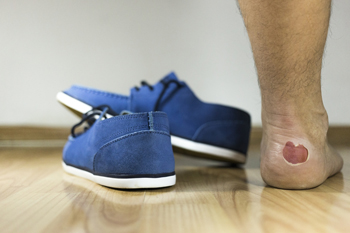Items filtered by date: December 2018
Diabetes and Neuropathy
 The definition of neuropathy is nerve damage, and it may be a result of many medical conditions that may be present. There are several symptoms that may be indicative of this condition, including tingling in the feet, burning sensations, or extreme sensitivity or pain when touched. Additionally, many patients are aware of muscle weakness and may find it difficult to urinate. Neuropathy may develop as a result of elevated sugar levels in the blood, and research has shown that diabetes accounts for sixty percent of neuropathy issues. If you are a diabetic patient and are experiencing any of these symptoms, it is strongly suggested to confer with a podiatrist who can perform a proper diagnosis and determine the best course of treatment for you.
The definition of neuropathy is nerve damage, and it may be a result of many medical conditions that may be present. There are several symptoms that may be indicative of this condition, including tingling in the feet, burning sensations, or extreme sensitivity or pain when touched. Additionally, many patients are aware of muscle weakness and may find it difficult to urinate. Neuropathy may develop as a result of elevated sugar levels in the blood, and research has shown that diabetes accounts for sixty percent of neuropathy issues. If you are a diabetic patient and are experiencing any of these symptoms, it is strongly suggested to confer with a podiatrist who can perform a proper diagnosis and determine the best course of treatment for you.
Neuropathy
Neuropathy can be a potentially serious condition, especially if it is left undiagnosed. If you have any concerns that you may be experiencing nerve loss in your feet, consult with Dr. Mark Gagnon from Advanced Podiatry. Our doctor will assess your condition and provide you with quality foot and ankle treatment for neuropathy.
What Is Neuropathy?
Neuropathy is a condition that leads to damage to the nerves in the body. Peripheral neuropathy, or neuropathy that affects your peripheral nervous system, usually occurs in the feet. Neuropathy can be triggered by a number of different causes. Such causes include diabetes, infections, cancers, disorders, and toxic substances.
Symptoms of Neuropathy Include:
- Numbness
- Sensation loss
- Prickling and tingling sensations
- Throbbing, freezing, burning pains
- Muscle weakness
Those with diabetes are at serious risk due to being unable to feel an ulcer on their feet. Diabetics usually also suffer from poor blood circulation. This can lead to the wound not healing, infections occurring, and the limb may have to be amputated.
Treatment
To treat neuropathy in the foot, podiatrists will first diagnose the cause of the neuropathy. Figuring out the underlying cause of the neuropathy will allow the podiatrist to prescribe the best treatment, whether it be caused by diabetes, toxic substance exposure, infection, etc. If the nerve has not died, then it’s possible that sensation may be able to return to the foot.
Pain medication may be issued for pain. Electrical nerve stimulation can be used to stimulate nerves. If the neuropathy is caused from pressure on the nerves, then surgery may be necessary.
If you have any questions, please feel free to contact one of our offices located in Crestwood, Orland Park, and Summit, IL . We offer the newest diagnostic and treatment technologies for all your foot care needs.
Causes of Corns
 A corn on the foot is described as a small area of hardened skin. Friction is generally the cause of the formation of corns, and they may develop as a result of wearing shoes that do not fit properly or not putting socks on while shoes are worn. Corns may typically produce pain, and comfort may be obtained after a protective pad is applied to the corn. Additional relief may be found after soaking the foot in warm water, followed by utilizing a pumice stone, which may be helpful in removing the hardened skin. If the corn is not diminishing in size after these treatments are performed, it is suggested to seek the counsel of a podiatrist who can properly remove the corn.
A corn on the foot is described as a small area of hardened skin. Friction is generally the cause of the formation of corns, and they may develop as a result of wearing shoes that do not fit properly or not putting socks on while shoes are worn. Corns may typically produce pain, and comfort may be obtained after a protective pad is applied to the corn. Additional relief may be found after soaking the foot in warm water, followed by utilizing a pumice stone, which may be helpful in removing the hardened skin. If the corn is not diminishing in size after these treatments are performed, it is suggested to seek the counsel of a podiatrist who can properly remove the corn.
If you have any concerns regarding your feet and ankles, contact Dr. Mark Gagnon of Advanced Podiatry. Our doctor will treat your foot and ankle needs.
Corns: What Are They? and How Do You Get Rid of Them?
Corns can be described as areas of the skin that have thickened to the point of becoming painful or irritating. They are often layers and layers of the skin that have become dry and rough, and are normally smaller than calluses.
Ways to Prevent Corns
There are many ways to get rid of painful corns such as wearing:
- Well-fitting socks
- Comfortable shoes that are not tight around your foot
- Shoes that offer support
Treating Corns
Treatment of corns involves removing the dead skin that has built up in the specific area of the foot. Consult with Our doctor to determine the best treatment option for your case of corns.
If you have any questions please feel free to contact one of our offices located in Crestwood, Orland Park, and Summit, IL . We offer the newest diagnostic and treatment technologies for all your foot and ankle needs.
Daily Foot Inspections Are Necessary for Diabetic Feet
 If you are a diabetic patient, the importance of taking care of your feet is crucial in helping to maintain overall health. This can be accomplished by performing a daily inspection of your feet and noticing if there are any cuts, bruises or red areas that may be present. Additionally, it may be beneficial to avoid walking barefoot. Choosing shoes that fit properly and are comfortable helps as well. If you observe a cut on your foot, it may typically need attention as quickly as possible by washing it with soap and water, using a mild ointment if necessary, followed by covering it with a gauze bandage. If you are diabetic, it is suggested to be under the care of a podiatrist who can offer proper advice on how to take care of diabetic feet.
If you are a diabetic patient, the importance of taking care of your feet is crucial in helping to maintain overall health. This can be accomplished by performing a daily inspection of your feet and noticing if there are any cuts, bruises or red areas that may be present. Additionally, it may be beneficial to avoid walking barefoot. Choosing shoes that fit properly and are comfortable helps as well. If you observe a cut on your foot, it may typically need attention as quickly as possible by washing it with soap and water, using a mild ointment if necessary, followed by covering it with a gauze bandage. If you are diabetic, it is suggested to be under the care of a podiatrist who can offer proper advice on how to take care of diabetic feet.
Diabetic foot care is important in preventing foot ailments such as ulcers. If you are suffering from diabetes or have any other concerns about your feet, contact Dr. Mark Gagnon from Advanced Podiatry. Our doctor can provide the care you need to keep you pain-free and on your feet.
Diabetic Foot Care
Diabetes affects millions of people every year. The condition can damage blood vessels in many parts of the body, especially the feet. Because of this, taking care of your feet is essential if you have diabetes, and having a podiatrist help monitor your foot health is highly recommended.
The Importance of Caring for Your Feet
- Routinely inspect your feet for bruises or sores.
- Wear socks that fit your feet comfortably.
- Wear comfortable shoes that provide adequate support.
Patients with diabetes should have their doctor monitor their blood levels, as blood sugar levels play such a huge role in diabetic care. Monitoring these levels on a regular basis is highly advised.
It is always best to inform your healthcare professional of any concerns you may have regarding your feet, especially for diabetic patients. Early treatment and routine foot examinations are keys to maintaining proper health, especially because severe complications can arise if proper treatment is not applied.
If you have any questions please feel free to contact one of our offices located in Crestwood, Orland Park, and Summit, IL . We offer the newest diagnostic and treatment technologies for all your foot and ankle needs.
Causes of Blisters
 If you notice a small area on your foot filled with fluid, you may have what is referred to as a blister. The fluid acts as a natural barrier that protects the new skin from any damage or injury that may occur. Friction is generally the main cause of blisters developing on the feet and may form as a result of wearing shoes that are too tight. Other causes of blisters may originate from an insect bite, or skin conditions that may include impetigo, chickenpox or a sunburn. Research has shown the importance of letting the blister drain on its own, and this may prevent an infection from developing. There may be ways to prevent blisters from forming, and these may include wearing footwear that fits properly, dusting your feet with powder, which may aid in absorbing excess sweat, or using sunscreen. Most blisters will heal on their own, but if you are experiencing a blister that keeps reoccurring or not healing properly, it is suggested to speak with podiatrist who can advise you on proper treatment and prevention techniques.
If you notice a small area on your foot filled with fluid, you may have what is referred to as a blister. The fluid acts as a natural barrier that protects the new skin from any damage or injury that may occur. Friction is generally the main cause of blisters developing on the feet and may form as a result of wearing shoes that are too tight. Other causes of blisters may originate from an insect bite, or skin conditions that may include impetigo, chickenpox or a sunburn. Research has shown the importance of letting the blister drain on its own, and this may prevent an infection from developing. There may be ways to prevent blisters from forming, and these may include wearing footwear that fits properly, dusting your feet with powder, which may aid in absorbing excess sweat, or using sunscreen. Most blisters will heal on their own, but if you are experiencing a blister that keeps reoccurring or not healing properly, it is suggested to speak with podiatrist who can advise you on proper treatment and prevention techniques.
Blisters may appear as a single bubble or in a cluster. They can cause a lot of pain and may be filled with pus, blood, or watery serum. If your feet are hurting, contact Dr. Mark Gagnon of Advanced Podiatry. Our doctor can provide the care you need to keep you pain-free and on your feet.
Foot Blisters
Foot blisters are often the result of friction. This happens due to the constant rubbing from shoes, which can lead to pain.
What Are Foot Blisters?
A foot blister is a small fluid-filled pocket that forms on the upper-most layer of the skin. Blisters are filled with clear fluid and can lead to blood drainage or pus if the area becomes infected.
Symptoms
(Blister symptoms may vary depending on what is causing them)
- Bubble of skin filled with fluid
- Redness
- Moderate to severe pain
- Itching
Prevention & Treatment
In order to prevent blisters, you should be sure to wear comfortable shoes with socks that cushion your feet and absorb sweat. Breaking a blister open may increase your chances of developing an infection. However, if your blister breaks, you should wash the area with soap and water immediately and then apply a bandage to the affected area. If your blisters cause severe pain it is important that you call your podiatrist right away.
If you have any questions, please feel free to contact one of our offices located in Crestwood, Orland Park, and Summit, IL . We offer the newest diagnostic and treatment technologies for all your foot care needs.
